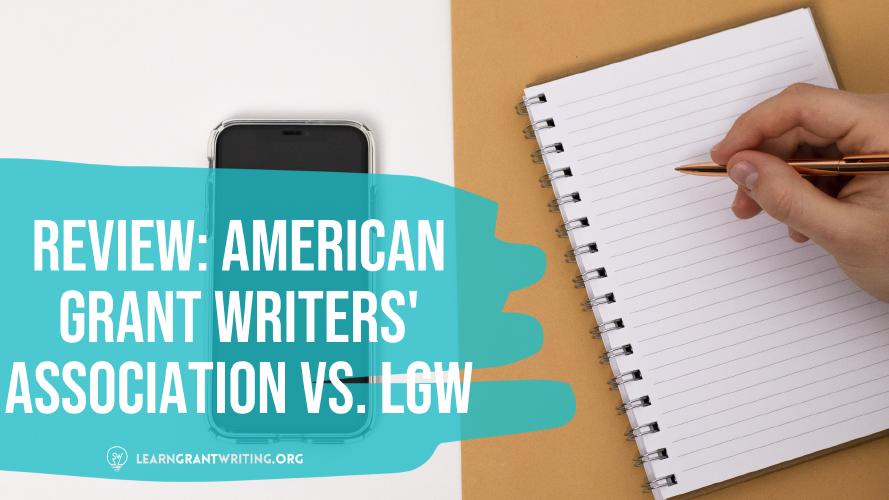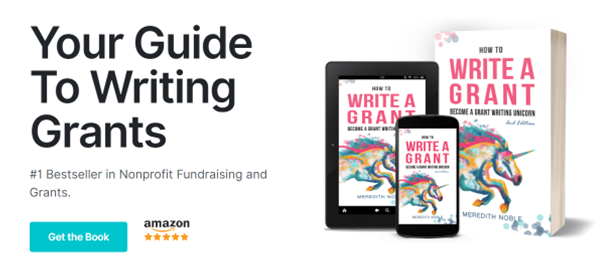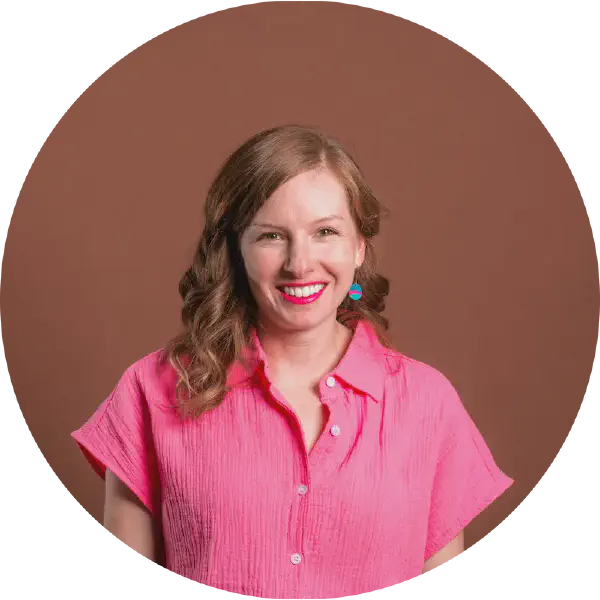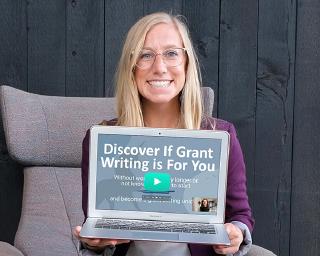Review of American Grant Writers’ Association versus Learn Grant Writing Online Courses
Sarah* approached the team at Learn Grant Writing after having an unpleasant and floundering experience with a different grant writing course offered through American Grant Writers’ Association (AGWA). We know the difference between AGWA and Learn Grant Writing, but we understand it’s not immediately evident when you are looking at all of your options for grant writing education. (P.S. Here is a review of the top 20 online grant writing courses). We’re publishing the review she offered to write so you can have the best information possible when deciding where to learn about grant writing.
*We have changed the name of the individual to protect her privacy. In every other regard, this article is a true and honest review.
Sarah’s Firsthand Review
Ah, to be a Grant Writing Unicorn! I’m underway because of Learn Grant Writing (LGW) but only after a self-esteem-crushing experience with American Grant Writers’ Association, Inc. (AGWA).
How I Found American Grant Writers’ Association
I had anticipated becoming a grant writer at some vague future date when I would have to leave my then-current job because of a long-anticipated move. COVID changed everything. I felt compelled to leave my job and that accelerated my grant writing plan. I knew I needed some education to learn the grant writing process and enrolled in AGWA’s “Program Development and Proposal Writing” course.
I chose AGWA because a co-worker had recently attended one of their beginner grant writing courses so I took it on faith that they would be good. Because of that I skipped performing any due diligence and that turned out to be a mistake. Maybe AGWA is better in person, but I can tell you that the online experience was incredibly lacking. It was a poor attempt by AGWA to make their traditional materials and old-school approach work in the digital realm. The course left me just barely more knowledgeable about grant writing than when I started.
How I Found Learn Grant Writing
As I was coming to the end of AGWA’s course, I had some questions about the lesson on budget models and emailed the instructor(s) accordingly. I received unhelpful and rude responses. In an attempt to better understand the lesson I went looking for "outside" help on the internet. While poking around, I came across Meredith Noble's book How to Write a Grant: Become a Grant Writing Unicorn. I added this book to my toolbox which proved to be a very smart move.
The LGW budget format discussed in the book, and the URL shared for a budget template made sense to me. Meredith’s email address was in the book so I reached out with a question or two. Not only did Meredith respond (awesome!) but she also answered my questions. LGW got me over the finish line for the last section of AGWA’s course. Meredith and I had additional exchanges during which she introduced me to LGW’s course and the Global Grant Writers Collective , encouraging me to consider giving LGW a chance. Lucky me!
I completed AGWA’s course, earning my certification but feeling like I was no further along in my grant writing education than where I’d been when I started. The difference was that now I had an ace up my sleeve: Learn Grant Writing. I took a short break between courses to reset my mind before diving in. Then, I took the leap that made all the difference. Come along with me as I compare my experiences between AGWA and LGW.
Discover Grant Writing as a Career
If you’re interested in becoming a grant writing consultant, check out this free training on how you can pull off a meaningful career change.
Access Free Class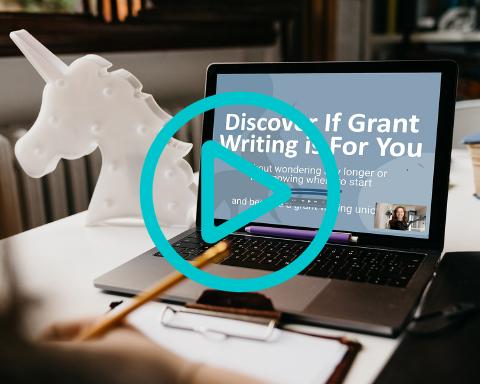
Comparing AGWA and Learn Grant Writing
The short answer is that there is no comparison between AGWA and LGW! From the skills I walked away with, lesson structure, manageability needed to complete the course, communication, and pricing, the two programs are vastly different.
Theory Vs. Practical Skills
At the end of AGWA’s course, I didn’t feel like I had learned how to write a compelling narrative, track workflow, optimize grant research, or even how to pursue grant writing work. Don’t get me wrong, there was plenty of content in lesson materials, but no real-world practice or application. There were fill-in-the-blank pages for “how to write a grant narrative” or LOI but no examples of how successful narratives or LOIs should read. Their methodology was that students learn the process vs. developing the actual skill. I completed the course never learning how to research a grant or the concept of vetting them - funders or grants - to ensure alignment.
This reminded me of when I was in college earning a teaching degree. There was class after class on all of the theory behind teaching, which is important. Then, I got out of the world of theory and into the classroom as a student-teacher. This made all the difference! Getting to do the practical work made a huge difference. AGWA’s course was theory-heavy; their students are never afforded a true opportunity to get practical practice. Submitting and resubmitting a narrative with no constructive feedback does not build experience.
LGW offers a practical and hands-on model for learning the skills to be a successful grant writer. LGW also provides guidance and tools for launching oneself into the business of grant writing. Every gap I experienced in AGWA’s course is addressed by LGW. Students are first guided on how to begin making connections. Then, LGW recommends a grant database and teaches how to vet those grants, how to write a compelling narrative, and teaches all the steps to completing an award-winning grant application. What a relief!

Lessons And Red Flags
AGWA would release each lesson only upon the submission and the subsequent approval of each assignment. I suppose that makes some sense - master the lesson before moving on - but it also felt very secretive and proprietary, as if their students couldn’t be trusted with the information. I wondered if I would be taught the secret handshake at the end!
The lesson materials were only provided in Word Doc or PDF format via email. Not ideal, but okay. No videos here! When you open the lesson files you’re faced with long, dense documents that are hard to digest and don’t facilitate note-taking. This was disappointing at the most basic level since I felt I’d paid enough money for the course that if this was their chosen format the materials should have been shipped to me as a part of the cost of the course (red flag). As I worked my way through the lessons, other things quickly became apparent: these materials were dated, poorly proofread, and clearly intended for in-person training.
The first thing AGWA stresses is the need for one’s writing and grammar to be meticulous. Ironically, their work was not. Every lesson contained errors (red flag). The screenshot below is from that first lesson. These types of mistakes were made consistently throughout the materials. Did these mistakes impede my learning? No. However, it gave me pause that if they were stressing the importance of being meticulous with one’s work, shouldn’t it track that their work would be meticulous?

There were informational gaps in the materials which made it apparent they were meant to be more fully developed during the give-and-take of an in-person training session. One example was AGWA’s assignment to write a letter of inquiry (LOI). There was no example given or guidance on how to best approach this. I expected there to be guidelines on formatting, phrasing, what kind of information to include, how to reference the organization (are acronyms ever okay?), etc.
The sample LOI in the course materials is nothing more than a template. Literally, fill-in-the-blank. The notes on what to write are a jumping-off point, but for someone who’s learning grant writing, this is a missed teaching opportunity.
As I completed the assignment and submitted it, I received only negative feedback – don’t do that, don’t say it that way, don’t, don’t, don’t – but never any constructive criticism. After repeated attempts to recraft my LOI, I was still getting only negative feedback. Eventually, I asked if they could provide me with an example for reference. I was firmly referred back to the very document that was already not answering my questions (red flag). I felt like I was beating my head against a wall. I wanted to learn! I wanted to get this right! I wanted to understand!
At LGW, grant writing isn’t treated as a club with a secret language that one must survive hazing before being allowed to get to the real tools and understanding of just how it’s successfully done.
Each lesson is laid out in methodical steps using videos, along with samples of work and templates. Videos? Hello, 21st century! The lessons are provided in videos and can also be accessed through the Kajabi app if straight-up listening is your jam. If you have questions, there’s a place for that right on the page of each lesson. And. They. Respond.
Even better, they host three coaching calls per month. These afford everyone in the LGW community the opportunity to submit questions or work you might want reviewed, and get live (constructive) feedback. They even have a community group on Circle, a community platform, for connecting with others in the LGW community directly with questions at every level of grant writing experience. The group always yields thoughtful and helpful responses.
Here’s an example of a coaching call. In this call, we dedicated much of the hour to a specific topic: how to navigate sticky situations as a grant writer. Not every coaching call has a particular topic to focus on, but you can get a taste of the energy present in these calls from this one!
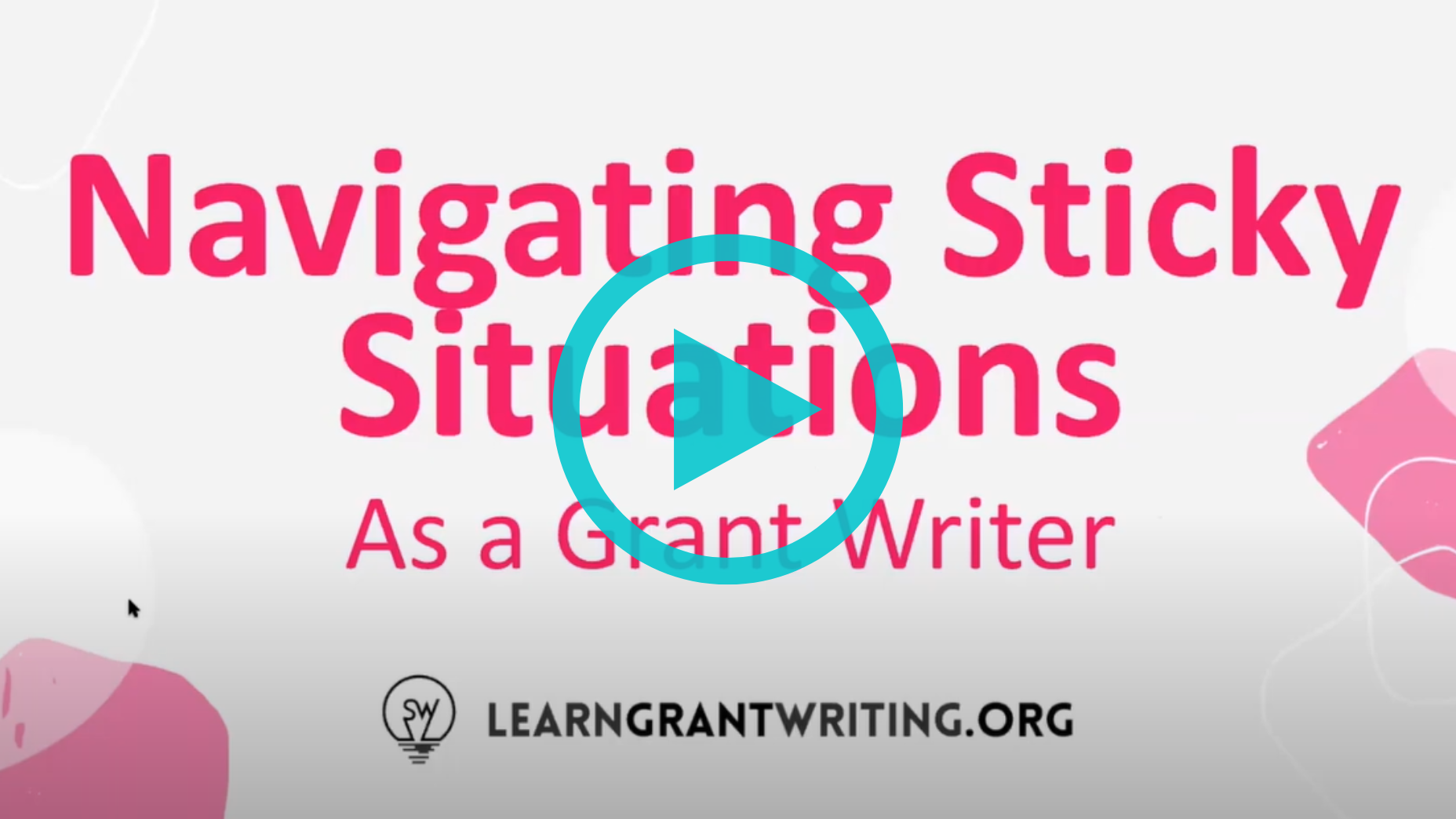
You can take a quick peek into a few other coaching calls too: here we’re talking about how to charge for your services and here we cover why we advocate for not volunteering your time.
Manageable vs. Unmanageable
Back to AGWA’s Word Doc and PDF lesson materials. These documents were sent attached in emails without any notes, explanations, or information. It was: download the attachments, do assignments, submit. When there’s such a density of materials that are poorly explained, it’s overwhelming. You immediately feel outside of the process and the implied mysteries.
The first lesson is strictly vocabulary based. Yes, there are terms that are important to know as a part of the grant writing process. I think that anyone worth their salt that’s doing grant writing would have the good sense to do a term search. A vocabulary lesson is a very juvenile approach. Supply the terms but don’t waste my time on a whole lesson! There are far meatier things to be learning about the grant writing process.
The Grant Writing Unicorn Method immediately draws you into the process, making grant writing doable and achievable. LGW’s way of presenting the lessons speaks to their core belief that anyone who has made the choice to learn grant writing has the stuff to make that happen.
Free Grant Writing Trainings
These how-to videos offer a smattering of webinar replays from our online grant writing training and feature topics such as working remotely, project management, fundraising, and how to utilize the Freedom of Information Act for federal funding.
Access Free Trainings
Communication (Or, Lack Thereof)
AGWA required enrollees to email any questions and submit completed assignments to one general email address. While this sounds fine, the communication was terrible. Responses were sluggish, and when they arrived, they were often too terse to be helpful. Responses were frequently conflicting. It was easy to surmise that there had to be at least two people responding to questions as well as reviewing completed assignments.
One instructor was a bit flippant to the point of rudeness when answering questions, and the feedback was rarely helpful. The other instructor was only marginally more helpful. The gist of more than one email response I received to a question was, “If you have to ask these questions, did you really do the work?” Wait, what? Here’s a screenshot of another inappropriate response:

The inconsistency in responses became glaring in the assessment of completed assignments. One instructor would reply with notes asking me to rewrite something while withholding the next lesson. A second email would arrive saying, “Nice work. See next lesson attached.”
To confirm what I suspected, I asked if more than one instructor was reviewing assignments and responding to students, which they confirmed. More than one perspective can be a good thing, but not when they are in direct conflict. There was no common standard. The lack of coordination among their instructors resulted in differing expectations and responses and thus creating a confusing and disjointed learning experience.
LGW has a clear point of view with a team that speaks with a consistent message. They engage with their enrollees. That added human connection makes the learning experience all the richer.
Do Your Homework
I ultimately did a little digging about AGWA (the due diligence step I had skipped early on) and found I wasn’t alone in my frustration and disappointment. I wasn’t imagining it! I found others who had taken AGWA’s courses, either in-person or online, all with the same concerns and complaints. I then circled back with that old co-worker of mine who’d taken AGWA’s course in-person and she provided additional insights. It tracked with what I was reading and experiencing. If I’d performed this step before giving them my money, I would have spent those dollars more wisely elsewhere.
Learn Grant Writing is all about building up, creating a positive learning environment, and encouraging each person on this path of grant writing!
Old School Vs. New School
AGWA is very old school in how they present the material, how they teach, and in that they play their cards close to the vest. No one is getting the secret sauce. There was not one opportunity to personally connect with an instructor.
LGW feels like sunshine and fresh air by comparison! Not only are they ready and willing to help and answer questions, but the community they have created is so supportive. This is readily evidenced when participating in the community coaching sessions, in addition to the videos that are used to present each lesson. There’s literally a face with the name!
Bang For Your Buck
Let’s talk dollars and cents. When I registered for AGWA’s course it was being offered at a discounted rate of $800 for a 4-6 week course. For that price, I came away having spent too many hours in frustration trying to discern what exactly they were teaching, receiving the bare minimum of help, left feeling unsure of exactly how to proceed in finding resources, and ultimately doubting my abilities. For my troubles, I came out on the other side poorly prepared to go forward with grant writing, with no community and no support. With AGWA I not only felt alone but also completely isolated.
Access to LGW’s Global Grant Writers Collective is $6,000 upfront for a year membership or $500/month for 12 months that then goes month to month as long as you’d like to remain a member. I was apprehensive about spending more money on more training after having such a terrible experience with AGWA, but this time I did my due diligence. I was able to determine that LGW would provide the learning environment I was looking for. Plus, rather than a 4-6 week program, LGW provides an ongoing year-round membership for support through the entire life cycle of a career transition.

LGW teaches a unique method to gain (paid) experience as a freelancer. Their goal is for their students to pay for our investment in the program within 3-4 months of joining. What other program shows you how to make your money back and then some?!
I love having access to all of the learning modules and those lovely templates, links, and comment sections at the bottom of each lesson. But wait, there’s more! Don’t forget the community coaching sessions and access to an interactive community of grant writers that are supporting each other. With Learn Grant Writing, I never feel like I’m out here alone.
I hope you found this review helpful as you consider your options for getting professionally trained as a grant writer. Let my experience save you time, money, and heartache!
Final Takeaway
As we mentioned before, a primary goal at Learn Grant Writing is to make learning the skill of grant writing fun, modern, and approachable. We know this is so needed. We’re grateful for the opportunity to do that for Sarah. Thank you Sarah for sharing your experience and thoughtful reflection!
Global Grant Writers Collective
The only modern membership for grant writers providing extensive curriculum, coaching, and community.
Learn More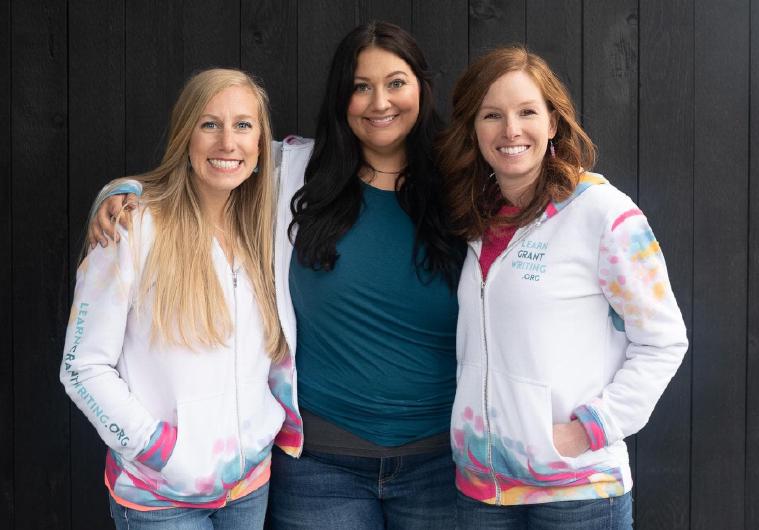
Grant Writing Resources
Keep reading our blog articles. Specifically, this one is a review of the top 20 online grant writing courses. Or, you can catch the video version of the review!
Also, check out our FREE Class on Writing Grants in just 7 easy steps!
Still have questions about the Global Grant Writers Collective? Check out this elaborate FAQ page: https://www.learngrantwriting.org/faq/
Did you know we have a self study online grant writing class for nonprofit professionals? Or for those that aren’t sure they will like grant writing. You can learn more about Grant Writing: From Start to Funded here:https://www.learngrantwriting.org/grant-writing-class/ Shoot us a DM on Instagram! 🦄 We’ll help you decide if our courses are right for you.

